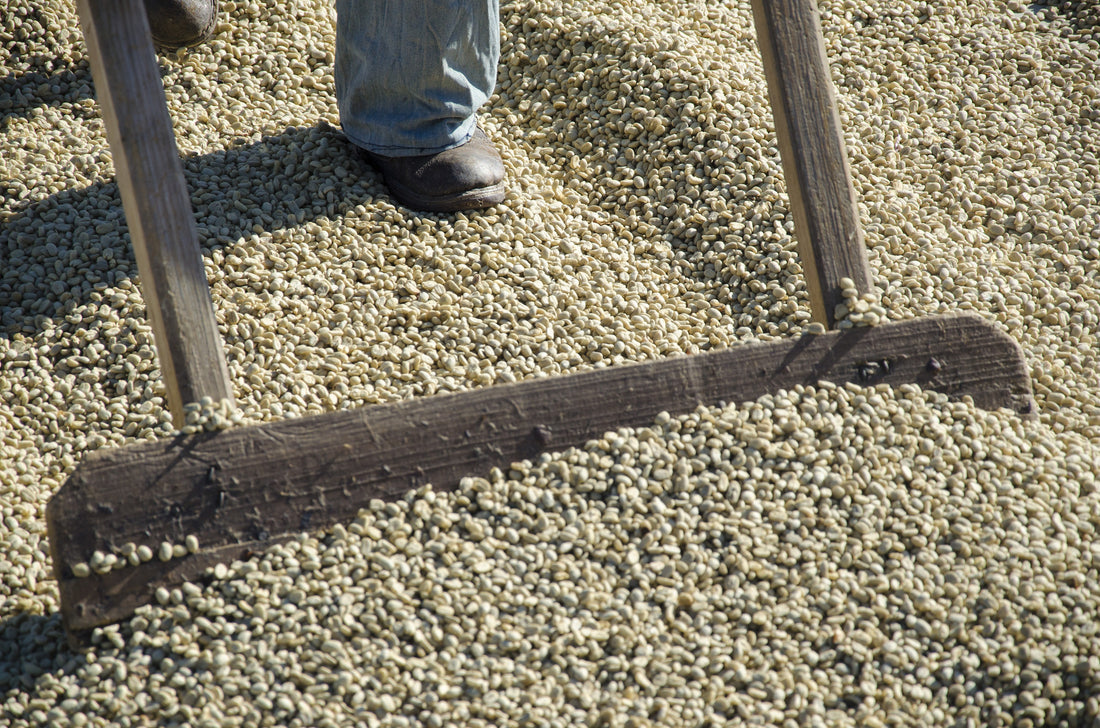
Fresh Green For Springtime
Share
Winter is starting to lose its grip and the fresh start of spring brings with it fresh green coffee. We blasted through this harvest just gone, we hope everyone enjoyed it as much as we did.
We will be releasing this harvest in two rounds, so keep your eyes peeled for the announcement of Round 2.
OUT OF AFRICA

The dominance of South America last time around has given way to the African contingent we now have incoming. The range and breadth of flavour across these washed coffees is quite something. A couple of boozier more natural-esque flavours surprised us on the cupping table. The careful considered processing that has gone into these coffees is exemplary.
Rwanda
With a new season comes a new Parallel (version 5, can you believe?) and this time it returns to Rwanda, even including beans from a farm present in the previous iteration, Cotecaga. Located in the mountains near the banks of the Kivu river, the wet mill went from processing 250,000 tonnes of coffee cherries in 2007 to a mere 45 tonnes in 2010, resulting in operations shutting down. Happily, it reopened in 2012 and over the last two seasons the focus has been on developing relationships of trust with producers through transparency, helping support the sustained growth of Rwandan industry, and providing high quality coffee to its customers.
Its partner in crime this time around comes from not-so-distant neighbours Kanzu, a wet mill similarly located near Lake Kivu. A finalist in the Rwandan Golden Cup 2007 and handed an award at the Cup Of Excellence 2008, their coffee processing is very much on point. After arriving at the wet mill, the cherries are immediately pulped and then dry fermented for 16 to 18 hours, before the mucilage is eliminated through washing, and the cherries are then soaked. The parchments are then dried on African beds for good air circulation. Waste-water produced during coffee processing is entirely treated with efficient micro-organisms to protect the water resources of the local community.
As always with Parallel's constituents, they taste delicious both in tandem and as standout single estate coffees.
Tanzania
Our green buyers Belco recently visited several washing stations in Tanzania and convinced producers to work directly with them, bypassing the Coffee Exchange. In this way Belco can guarantee the quality of coffee washing, traceability and long term relationships with Tanzania washing stations. You can thus enjoy this Tanzanian bean assured that the farmers will obtain a better price for their coffee and as a result a better quality of life.
Wala AB hails from the eponymous village and washing station situated in the south west of Tanzania and boasts more than 750 members. They are implementing a system to follow good farming practice in order to increase production.
SOUTH AMERICA

We still have still have plenty of our "fun-sized" washed maracaturra from Buenos Aires (Nicaragua). But for those of you wanting to try something new from across the Atlantic, we have Buenos Aires' fellow countryman El Toston, a washed caturra named after a local form of plantain tortilla. El Toston was fermented for 18-20 hours followed by drying out on the patio rather than over plastics as is very common in Nicaragua. Drying over plastics often causes quality issues, which can lead to high levels of water activity causing fast aging and a flavourless coffee. Not so on the patio, leaving us in this case with some classic South American chocolate sweetness.
After how much we loved the Colombian from the harvest just passed, we felt it rude not to sample a standout from this new crop. Formed in 2007, the association La Cristalina was set up with 55 members. Its aim was to supervise coffee growing and promote the quality of the terroir. Today La Cristalina has 167 members who promote quality through strict farming practice and an immeasurable passion for coffee. They also strive to improve the quality of life of their members by obtaining the best possible prices for its specialty coffee on the world market.
The coffee growing zones of La Cristalina are located at between 1500 and 1900m above sea level on naturally volcanic soils that give the coffee all its complexity and subtlety. The coffee plants are exclusively the Caturra variety and grow under the shade of luxurious vegetation, enjoying an annual average temperature of 18°C to ensure a slow and consistent cherry maturation. Ours is a fully washed bean promising clean fruit notes and a honeyed sweetness.

First Round Knockout From The Luchador?
Aaand, last but not least, the one we know everyone will be most excited for, coming all the way from sunny Mexico, we introduce:
Chiapas, our new decaf!
Jokes aside, we are promised some very good things about this bean. Decaffeinated using Mexican Water Mountain super-saturated with all the aromatic compounds that gives coffee its flavour but with no caffeine, the rules of osmosis guarantee that only the caffeine is extracted from the bean and none of its flavour. This means decaf that tastes great. Could we even have a decaf that makes a great filter? We look forward to finding that out with you.
